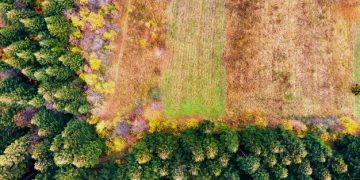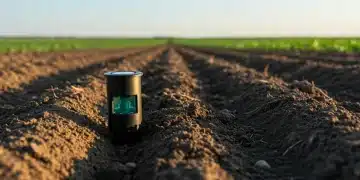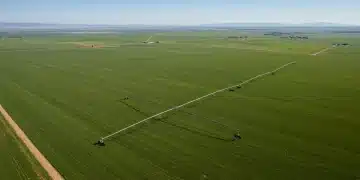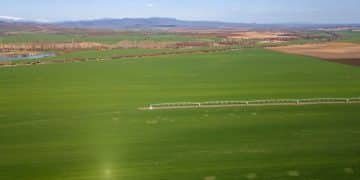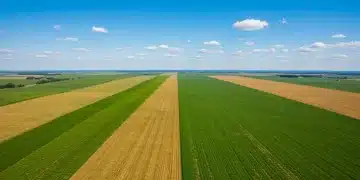Water conservation methods in farming that really work
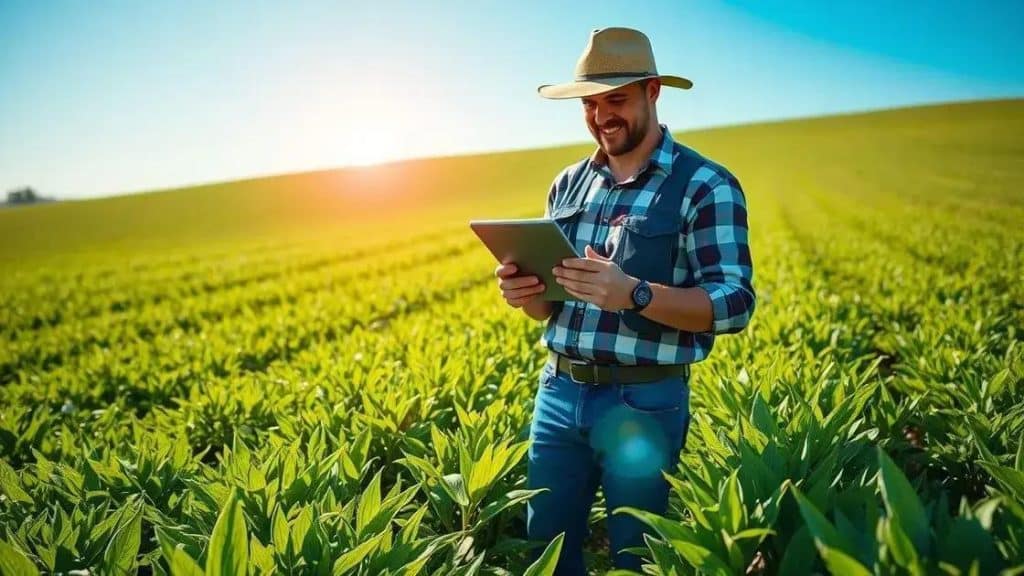
Water conservation methods in farming, including smart irrigation systems, cover cropping, and rainwater harvesting, effectively enhance water efficiency and soil health while minimizing waste, ensuring sustainable agricultural practices.
Water conservation methods in farming are becoming increasingly crucial as agricultural practices adapt to changing climates. Have you ever wondered how these techniques can not only conserve water but also boost your crop yields? Let’s dive into some effective strategies that farmers can adopt today.
Understanding water scarcity in agriculture
Understanding water scarcity in agriculture is vital for farmers facing the challenges of inconsistent rainfall and rising temperatures. Water is crucial for crops, and its shortage can lead to diminished yields. By recognizing the factors contributing to this issue, farmers can take proactive measures.
Causes of Water Scarcity
Several factors contribute to water scarcity in agricultural practices. First, climate change affects precipitation patterns, leading to dry spells. Additionally, population growth increases demand for water resources. Moreover, inefficient water usage in traditional farming practices worsens the situation.
Impact on Agriculture
When water scarcity occurs, crops suffer significantly. This can result in issues like stunted growth and lower quality produce. Farmers may also face financial strains due to reduced harvests, affecting their livelihoods.
- Deficit irrigation techniques can help manage limited water availability.
- Crop rotation strategies can enhance soil moisture retention.
- Utilizing drought-resistant crop varieties can minimize damage.
Furthermore, soil management plays a crucial role. Healthy soil retains moisture better, lowering the risk of crop stress during dry periods. Techniques such as cover cropping and organic amendments can improve soil structure and promote water retention.
Solutions to Combat Water Scarcity
Farmers can implement various solutions to combat water scarcity. Innovative irrigation methods, such as drip irrigation, deliver water directly to the plant roots, minimizing waste. Selecting crops that are better suited for arid environments can also make a significant difference.
Additionally, rainwater harvesting is an effective way to store water during heavy rains for later use. Engaging in community programs focused on sustainable practices fosters collaboration among farmers, increasing overall water efficiency.
Effective irrigation techniques for better conservation

Effective irrigation techniques are essential for enhancing water conservation in farming. These methods not only conserve water but also improve crop yields. With the right approach, farmers can maximize their resources and protect their crops.
Drip Irrigation
One of the most effective methods is drip irrigation. This technique delivers water directly to the roots of plants. By minimizing evaporation and runoff, farmers can use significantly less water. This system is ideal for high-value crops and has been shown to increase productivity.
Sprinkler Systems
Another efficient method is the use of sprinkler systems. These systems can cover large areas and are beneficial in various climatic conditions. They allow for even water distribution, reducing water waste. Farmers can also schedule watering times according to weather conditions, enhancing overall efficiency.
- Choose the right system based on crop type and soil conditions.
- Regular maintenance ensures optimal performance.
- Consider implementing smart controllers for automated watering.
Additionally, surface irrigation can be effective in certain scenarios. This method involves flooding fields with water. While it is often less efficient than drip or sprinkler systems, it can be suitable for specific crops and soil types. With proper management, farmers can limit water loss and maintain crop health.
Implementing soil moisture sensors can also enhance irrigation strategies. These devices provide real-time data on soil conditions, allowing farmers to water only when necessary. This approach can significantly reduce water usage and promote sustainable farming practices.
Rainwater Harvesting
Another innovative technique is rainwater harvesting. By collecting rainwater from rooftops and other surfaces, farmers can supplement their water supply during dry periods. This sustainable practice not only conserves precious resources but also reduces dependency on traditional water sources.
Combining these irrigation techniques leads to improved water conservation. Adopting a mixture of methods tailored to specific crop needs can create a more resilient farming system. Through education and technology, farmers are better equipped to manage their water resources effectively.
Soil management practices that promote water retention
Soil management practices play a critical role in promoting water retention. Healthy soil not only supports plant growth but also helps conserve precious water resources. Effective management techniques can lead to improved crop yield and sustainability.
Cover Cropping
One popular method is cover cropping. This involves planting specific crops, like clover or rye, during off-seasons. These cover crops improve soil structure, enhance organic matter, and reduce erosion. Additionally, they help retain moisture in the soil, making water more available during dry periods.
Organic Matter Addition
Adding organic matter, such as compost or well-rotted manure, is another effective practice. Organic matter increases soil fertility and improves its capacity to hold water. A healthy mix of nutrients allows plants to thrive while minimizing the need for chemical fertilizers.
- Mix compost into the topsoil for better moisture retention.
- Use mulch around plants to insulate the soil and reduce evaporation.
- Incorporate green manure when tilling to boost soil health.
Moreover, no-till farming reduces soil disturbance. When farmers avoid turning the soil, they help maintain its structure and reduce compaction. This method enhances water infiltration and retention, allowing roots to access moisture more efficiently.
Practicing crop rotation can also be beneficial. By alternating different crops, farmers can enhance soil health and water retention. Diverse root structures help create channels for water to penetrate the soil more deeply. This practice also minimizes pests and diseases, contributing to a healthier ecosystem.
Soil Testing and Management
Regular soil testing is vital for effective management. By understanding soil composition and pH levels, farmers can tailor their practices to maximize moisture retention. Knowing what nutrients are present allows for better planning and adjustments, ensuring crops have what they need.
Investing in technology, such as moisture sensors, can provide real-time data. These tools help farmers make informed decisions about watering and fertilization. By optimizing soil conditions, they enhance water retention and promote sustainable agriculture.
Innovative technologies for water conservation in farming

Innovative technologies are transforming water conservation practices in farming. These advancements help farmers use water more efficiently and sustainably. By integrating technology, agriculture can address the pressing challenges of water scarcity.
Smart Irrigation Systems
One of the most revolutionary innovations is smart irrigation systems. These systems utilize sensors and weather data to optimize watering schedules. By only watering when necessary, farmers can significantly reduce water waste. This technology also ensures that crops receive the right amount of moisture, leading to healthier plants.
Drones for Monitoring
Another breakthrough is the use of drones in agriculture. Drones can monitor crop health and soil conditions from the air. This technology allows farmers to identify areas that need more water or care. By targeting specific zones, farmers can apply resources more efficiently, conserving water.
- Drones can map out irrigation zones for better planning.
- They help assess plant stress and moisture levels.
- Farmers can save time and labor with aerial monitoring.
Additionally, soil moisture sensors are vital tools for modern farming. These sensors provide real-time data about the moisture content in the soil. With this information, farmers can adjust their irrigation practices accordingly, ensuring they use only what is necessary to keep plants healthy and productive.
Furthermore, mobile applications are enabling farmers to manage their water usage more effectively. These apps offer insights into weather patterns, soil conditions, and water availability. With this data at their fingertips, farmers can make informed decisions quickly.
Rainwater Harvesting Technology
Innovative rainwater harvesting technologies are gaining popularity as a sustainable way to collect and store water. By capturing rainwater, farmers can supplement their irrigation needs during dry periods. This method reduces reliance on conventional water sources and promotes a more balanced ecosystem.
Finally, precision agriculture practices contribute to effective water conservation. This approach combines data analysis, satellite imagery, and specialized equipment to streamline watering processes. By using resources more judiciously, farmers can reduce their environmental impact while increasing crop yields.
FAQ – Frequently Asked Questions about Water Conservation Methods in Farming
What are the benefits of using smart irrigation systems?
Smart irrigation systems optimize water usage by using sensors and weather data, reducing waste and ensuring crops get the right amount of moisture.
How does cover cropping improve soil health?
Cover cropping enhances soil structure, reduces erosion, and retains moisture, which contributes to healthier plants and better water retention.
What is rainwater harvesting and why is it important?
Rainwater harvesting is the practice of collecting and storing rainwater for irrigation, reducing dependency on traditional water sources and promoting sustainability.
How do soil moisture sensors help in farming?
Soil moisture sensors provide real-time data about moisture levels, allowing farmers to water their crops only when necessary, conserving water.

